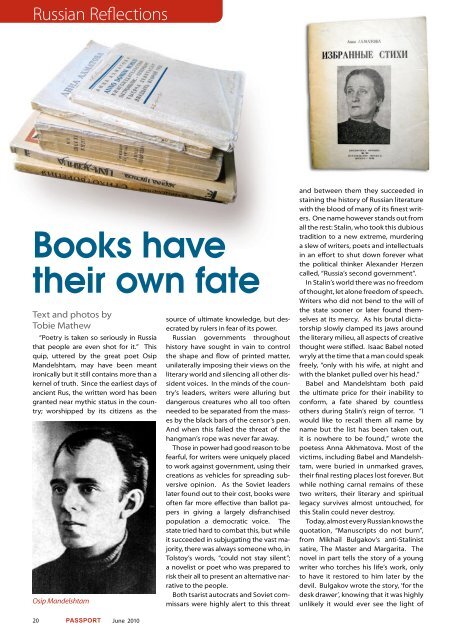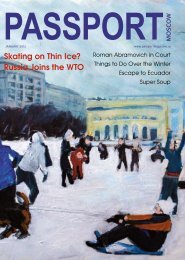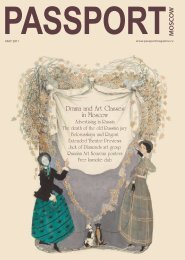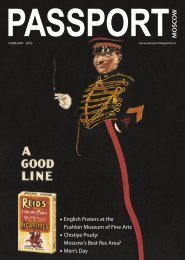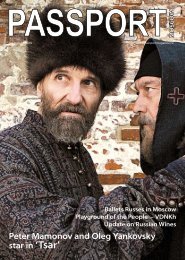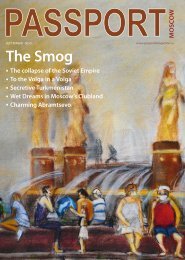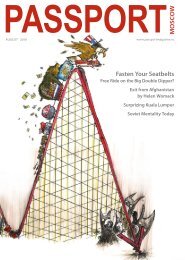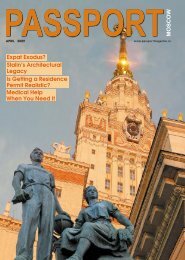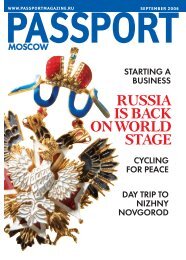M O S C O W Interview with Leonid Shishkin - Passport magazine
M O S C O W Interview with Leonid Shishkin - Passport magazine
M O S C O W Interview with Leonid Shishkin - Passport magazine
You also want an ePaper? Increase the reach of your titles
YUMPU automatically turns print PDFs into web optimized ePapers that Google loves.
Russian Reflections<br />
Books have<br />
their own fate<br />
Text and photos by<br />
Tobie Mathew<br />
“Poetry is taken so seriously in Russia<br />
that people are even shot for it.” This<br />
quip, uttered by the great poet Osip<br />
Mandelshtam, may have been meant<br />
ironically but it still contains more than a<br />
kernel of truth. Since the earliest days of<br />
ancient Rus, the written word has been<br />
granted near mythic status in the country;<br />
worshipped by its citizens as the<br />
Osip Mandelshtam<br />
20 June 2010<br />
source of ultimate knowledge, but desecrated<br />
by rulers in fear of its power.<br />
Russian governments throughout<br />
history have sought in vain to control<br />
the shape and flow of printed matter,<br />
unilaterally imposing their views on the<br />
literary world and silencing all other dissident<br />
voices. In the minds of the country’s<br />
leaders, writers were alluring but<br />
dangerous creatures who all too often<br />
needed to be separated from the masses<br />
by the black bars of the censor’s pen.<br />
And when this failed the threat of the<br />
hangman’s rope was never far away.<br />
Those in power had good reason to be<br />
fearful, for writers were uniquely placed<br />
to work against government, using their<br />
creations as vehicles for spreading subversive<br />
opinion. As the Soviet leaders<br />
later found out to their cost, books were<br />
often far more effective than ballot papers<br />
in giving a largely disfranchised<br />
population a democratic voice. The<br />
state tried hard to combat this, but while<br />
it succeeded in subjugating the vast majority,<br />
there was always someone who, in<br />
Tolstoy’s words, “could not stay silent”;<br />
a novelist or poet who was prepared to<br />
risk their all to present an alternative narrative<br />
to the people.<br />
Both tsarist autocrats and Soviet commissars<br />
were highly alert to this threat<br />
and between them they succeeded in<br />
staining the history of Russian literature<br />
<strong>with</strong> the blood of many of its finest writers.<br />
One name however stands out from<br />
all the rest: Stalin, who took this dubious<br />
tradition to a new extreme, murdering<br />
a slew of writers, poets and intellectuals<br />
in an effort to shut down forever what<br />
the political thinker Alexander Herzen<br />
called, “Russia’s second government”.<br />
In Stalin’s world there was no freedom<br />
of thought, let alone freedom of speech.<br />
Writers who did not bend to the will of<br />
the state sooner or later found themselves<br />
at its mercy. As his brutal dictatorship<br />
slowly clamped its jaws around<br />
the literary milieu, all aspects of creative<br />
thought were stifled. Isaac Babel noted<br />
wryly at the time that a man could speak<br />
freely, “only <strong>with</strong> his wife, at night and<br />
<strong>with</strong> the blanket pulled over his head.”<br />
Babel and Mandelshtam both paid<br />
the ultimate price for their inability to<br />
conform, a fate shared by countless<br />
others during Stalin’s reign of terror. “I<br />
would like to recall them all name by<br />
name but the list has been taken out,<br />
it is nowhere to be found,” wrote the<br />
poetess Anna Akhmatova. Most of the<br />
victims, including Babel and Mandelshtam,<br />
were buried in unmarked graves,<br />
their final resting places lost forever. But<br />
while nothing carnal remains of these<br />
two writers, their literary and spiritual<br />
legacy survives almost untouched, for<br />
this Stalin could never destroy.<br />
Today, almost every Russian knows the<br />
quotation, “Manuscripts do not burn”,<br />
from Mikhail Bulgakov’s anti-Stalinist<br />
satire, The Master and Margarita. The<br />
novel in part tells the story of a young<br />
writer who torches his life’s work, only<br />
to have it restored to him later by the<br />
devil. Bulgakov wrote the story, ‘for the<br />
desk drawer’, knowing that it was highly<br />
unlikely it would ever see the light of


